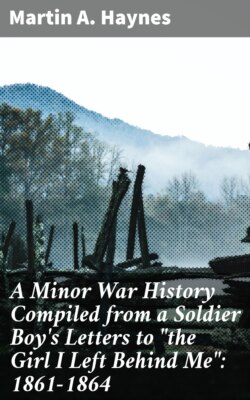Читать книгу A Minor War History Compiled from a Soldier Boy's Letters to "the Girl I Left Behind Me": 1861-1864 - Martin A. Haynes - Страница 36
На сайте Литреса книга снята с продажи.
XXXIII
ОглавлениеTable of Contents
Camp Beaufort,
Near Budd’s Ferry, Md., Dec. 15, 1861.
IWISH you could take a peek-in on my luxurious surroundings. I have a barber’s chair to sit in. It has a canvas back and seat, and was built by Damon [George B.,] the Jack-at-all-trades of my tent’s party. There is a good fire, plenty of apples at my elbow, and, all in all, I am a pampered child of luxury. There are only two besides myself occupying the castle just at present—George Slade and George Damon—very companionable fellows, and who have seen a great deal of the world. Two—George Cilley and Bill Wilber—are in the hospital, and E. Norman Gunnison (a fellow with a decided talent for writing poetry) is in the guard house for some infraction of camp discipline. So we three that are left have plenty of room and get along mighty comfortably. Slade and Damon are good cooks. We buy flour, butter, sugar, &c., and cook a big slack of fritters whenever the spirit moves us. And we have rabbits, chickens, wheat biscuits, and various other camp luxuries. And occasionally we make molasses candy of an evening. All this, you will understand, is outside of and in addition to our regular army rations.
Here is our schedule of duty: Reveille beats at sunrise, when we turn out and answer to roll call. Then comes the breakfast call. At 9 o’clock is guard mount—that is, the company which has been on guard duty is relieved by another. The remaining companies drill from 9 to 11 and 3 to 5—but now only occasionally, owing to weather conditions. Dinner call at 12. Dress parade at sunset. Tattoo is beat at 8, when the roll is called and the men can go to bed. The Colonel says we will not have much drilling for the rest of the winter.
The boys find plenty to amuse themselves with, and things are by no means dull here in camp. Quite a number of musical instruments have found their way in, and there are men here who know how to play them too—fiddles and banjos and such.
We had a large party of New Hampshire people in camp today—E. H. Rollins, John P. Hale, Daniel Clark, Waterman Smith, E. A. Straw and others. There were also four good-looking New Hampshire women, and they got three rousing cheers at dress parade.
The old rumor factory now has it that the Second is going to Washington within a few days, to act as provost guard. Joe Hubbard’s boxes have not yet arrived, and may not for some time yet. The railroads leading into Washington are buried in freight and express matter, but I suppose our stuff will get through in due time.
You inquire what sort of a place this is. Well, it comes about as near to being no place at all as it could and still be on the map. There are but few houses hereabouts, and a good part of these are just negro cabins. There is a store a little ways from here, but I have yet to discover where enough local trade can come from to keep it going. The Potomac is only about an eighth of a mile from our camp. From the western edge of the strip of woods in which we are camped one can see the river for a long distance, with the rebel batteries, and the upper works of their gunboat “George Paige,” which sticks close up in Quantico Creek, out of reach of our gunboats. The river here is less than two miles wide and the deep-water channel runs very near the other side, so a large vessel has to run close in to the rebel batteries to get through at all.
We witnessed a lively little brush the other day. The rebels started to throw up some works on Shipping Point, and the “Harriet Lane” and five other gunboats dropped down and told them to stop it. The way they pitched shells onto that point was a caution. And a few nights ago—just for fun, as near as I could figure it out—one of our gunboats dropped down to the upper battery and had some sport for a while. I always did like fireworks, so I got the countersign and went out to take in the display. It was worth the money.
You have thought to inquire for “Heenan.” Alas! Poor Heenan! It grieves me to inform you that the other night he got into an argument with a Company D boy. Just what condition the other fellow was left in—if still alive—I don’t know. But when Heenan returned to the bosom of his family he was a sight. His face was badly bruised, both eyes in mourning, and one thumb chewed to a jelly. He says he wanted his thumbs to be mates, and the other was crushed out of shape before he left Portsmouth.
